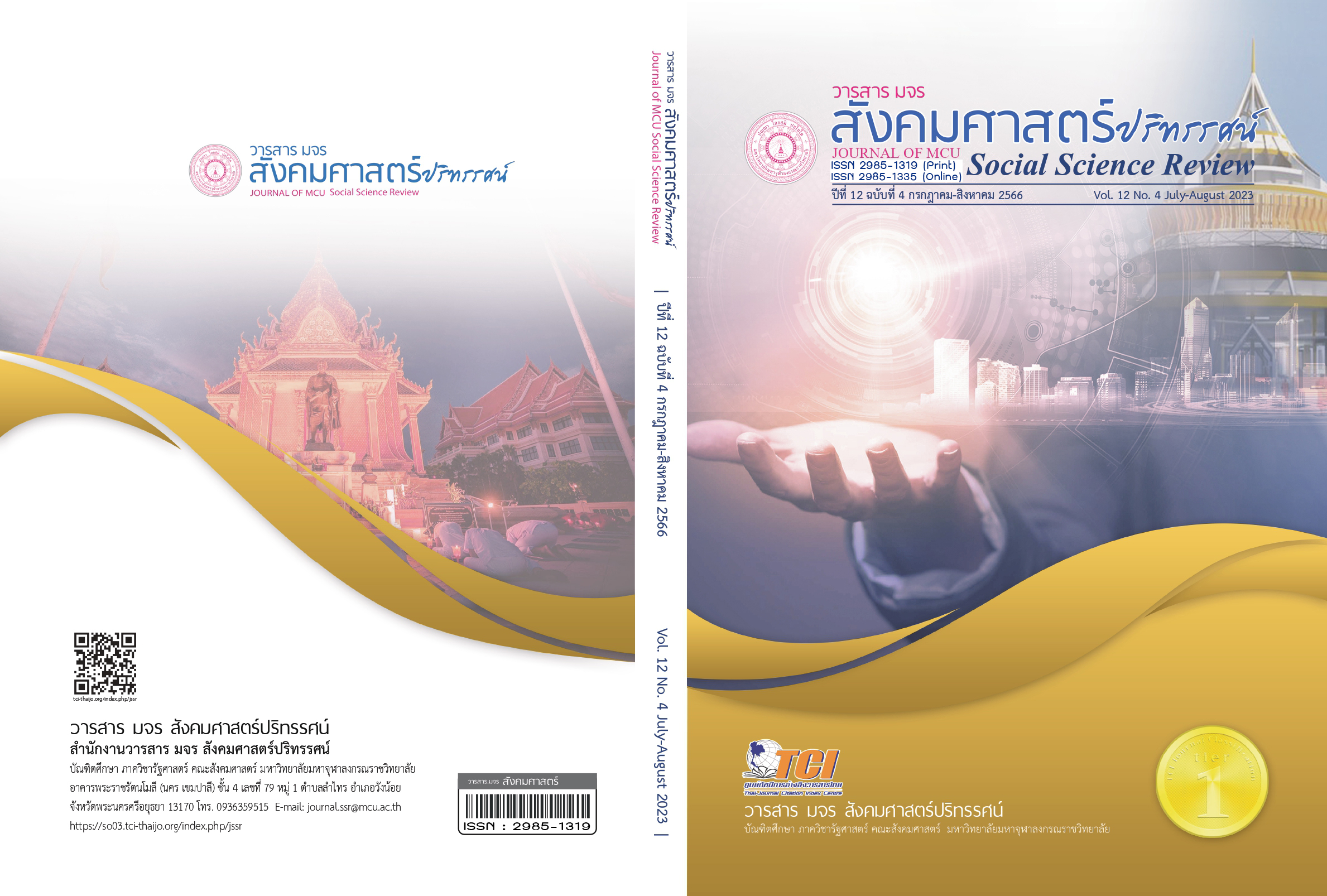ความต้องการจำเป็นในการพัฒนาสมรรถนะด้านการจัดโปรแกรมนันทนาการสำหรับผู้นำนักศึกษา มหาวิทยาลัยเทคโนโลยีราชมงคลในเขตภาคกลาง
คำสำคัญ:
ความต้องการจำเป็น, สมรรถนะผู้นำนักศึกษา, การจัดโปรแกรมนันทนาการบทคัดย่อ
บทความวิจัยนี้มีวัตถุประสงค์เพื่อ 1. ศึกษาความต้องการจำเป็นในการพัฒนาสมรรถนะด้านการจัดโปรแกรมนันทนาการสำหรับผู้นำนักศึกษา และ 2. ศึกษาแนวทางในการพัฒนาโปรแกรมเสริมสร้างสมรรถนะด้านการจัดโปรแกรมนันทนาการ โดยเป็นการวิจัยแบบผสานวิธี ใช้กลุ่มตัวอย่างจำนวน 712 คน เป็นผู้บริหารและเจ้าหน้าที่จำนวน 34 คน (เลือกทุกหน่วย) ผู้นำนักศึกษาจำนวน 278 คน (ใช้ตารางของเครจซี่และมอร์แกน) และนักศึกษาจำนวน 400 คน (คำนวณจากสูตรของคอแครน) เครื่องมือที่ใช้เป็นแบบสอบถามมาตราส่วนประมาณค่า 5 ระดับ มีรูปแบบเป็นแบบตอบสนองคู่ ผู้วิจัยรวบรวมและวิเคราะห์ข้อมูลด้วยตนเองโดยใช้สถิติได้แก่ ค่าร้อยละ ค่าเฉลี่ย ค่าส่วนเบี่ยงเบนมาตรฐาน และค่าดัชนีความต้องการจำเป็นประยุกต์
ผลการวิจัยพบว่า ผู้นำนักศึกษามีความต้องการจำเป็นในด้านการประเมินผลโปรแกรมนันทนาการอยู่ในลำดับสูงสุด (PNImodified = 0.12) รองลงมาคือ ด้านการนำโปรแกรมนันทนาการไปใช้ มีค่า PNImodified เท่ากับ 0.11 ด้านการวางแผนโปรแกรมนันทนาการ มีค่า PNImodified เท่ากับ 0.09 และด้านการประเมินความพร้อมของโปรแกรมนันทนาการ มีค่า PNImodifiedเท่ากับ 0.08 ตามลำดับ ซึ่งมีค่าแตกต่างกันไม่มากนัก ทั้งนี้อาจเป็นเพราะผู้นำนักศึกษามีสมรรถนะอยู่ในระดับปานกลางในทุกด้าน ส่วนแนวทางในการพัฒนาโปรแกรมเสริมสร้างสมรรถนะด้านการจัดโปรแกรมนันทนาการ คือ สถาบันการศึกษาควรเสริมสร้างความรู้ และพัฒนาทักษะด้านการจัดโปรแกรมนันทนาการให้กับผู้นำนักศึกษา เพื่อพัฒนาสมรรถนะของผู้นำนักศึกษาให้สามารถจัดกิจกรรมนันทนาการในสถานศึกษาได้อย่างมีประสิทธิภาพ
เอกสารอ้างอิง
กัมพล ดวงสีใส. (2563). คู่มือปฏิบัติติงานด้านการเงิน สำหรับกิจกรรมนักศึกษา. ปทุมธานี: กองพัฒนานักศึกษา มหาวิทยาลัยเทคโนโลยีราชมงคลธัญบุรี.
จิรานุวัฒน์ คำปลิว. (2561). ความสัมพันธ์ระหว่างเจตคติและพฤติกรรมการปฏิบัติเกี่ยวกับนันทนาการของนักศึกษามหาวิทยาลัยเทคโนโลยีราชมงคลกรุงเทพ (ปริญญานิพนธ์ศิลปศาสตรมหาบัณฑิต สาขาวิชาการจัดการกีฬาและนันทนาการ). กรุงเทพฯ: มหาวิทยาลัยศรีนครินทรวิโรฒ.
ณรงค์ วิชัยรัตน์. (2560). การพัฒนาโปรแกรมฝึกอบรมเพื่อเสริมสร้างสมรรถนะผู้นำนันทนาการระดับต้น (ปรัชญาดุษฎีบัณฑิต สาขาวิชา กีฬา นันทนาการและการท่องเที่ยว). กรุงเทพฯ: มหาวิทยาลัยศรีนครินทรวิโรฒ.
ดาวดล จันทรประทิน และคณะ. (2560). การมีส่วนร่วมในการดำเนินกิจกรรมเสริมหลักสูตรตามวงจรคุณภาพเดมมิ่ง (Deming Cycle) ของนักศึกษามหาวิทยาลัยเทคโนโลยีราชมงคลศรีวิชัย พื้นที่สงขลา. วารสารวิจัยมหาวิทยาลัยเทคโนโลยีราชมงคลศรีวิชัย, 9(1), 98-112.
ธีรวุฒิ เอกะกุล. (2543). ระเบียบวิธีวิจัยทางพฤติกรรมศาสตร์และสังคมศาสตร์. อุบลราชธานี: สถาบันราชภัฏอุบลราชธานี.
พฤกษ์ เถาถวิล. (2551). บทบาทอาจารย์ที่ปรึกษาในการดําเนินงานโครงการค่ายเรียนรู้คุณธรรมนําชีวิตพอเพียงปี 2551. กรุงเทพฯ: สำนักงานคณะกรรมการการอุดมศึกษา.
สมควร โพธิ์ทอง. (2551). การวางแผนกิจกรรมนันทนาการ. กรุงเทพฯ: ภาควิชาสันทนาการ มหาวิทยาลัยศรีนครินทรวิโรฒ.
สำนักงานคณะกรรมการการอุดมศึกษา. (2557). บนเส้นทางพัฒนานักศึกษาสู่ความเป็นพลเมืองโลก ประเด็นท้าทาย โอกาส และแนวทางพัฒนา สังเคราะห์บทเรียนจากผลการสัมมนาทางวิชาการ (APSSA 2008-2014). กรุงเทพฯ: สำนักงานคณะกรรมการการอุดมศึกษา.
สำนักนันทนาการ กรมพลศึกษา กระทรวงการท่องเที่ยวและกีฬา. (2562). ผู้นำนันทนาการ. กรุงเทพฯ: โรงพิมพ์เอส.ออฟเซ็ทกราฟฟิคดีไซน์.
สำนักนายกรัฐมนตรี. (2561). ยุทธศาสตร์ชาติ พ.ศ. 2561 – 2580. สืบค้น 15 ตุลาคม 2564, จาก http://www.ratchakitcha.soc.go.th/DATA/PDF/2561/A/082/T_0001.PDF
องค์การยูนิเซฟ ประเทศไทย. (2563). พัฒนาเยาวชนให้พร้อมรับมือกับอนาคตได้อย่างมั่นใจ. สืบค้น 15 ตุลาคม 2564, จาก https://www.unicef.org/thailand/th
ดาวน์โหลด
เผยแพร่แล้ว
รูปแบบการอ้างอิง
ฉบับ
ประเภทบทความ
สัญญาอนุญาต
ลิขสิทธิ์ (c) 2023 วารสาร มจร สังคมศาสตร์ปริทรรศน์

อนุญาตภายใต้เงื่อนไข Creative Commons Attribution-NonCommercial-NoDerivatives 4.0 International License.
เพื่อให้เป็นไปตามกฎหมายลิขสิทธิ์ ผู้นิพนธ์ทุกท่านต้องลงลายมือชื่อในแบบฟอร์มใบมอบลิขสิทธิ์บทความให้แก่วารสารฯ พร้อมกับบทความต้นฉบับที่ได้แก้ไขครั้งสุดท้าย นอกจากนี้ ผู้นิพนธ์ทุกท่านต้องยืนยันว่าบทความต้นฉบับที่ส่งมาตีพิมพ์นั้น ได้ส่งมาตีพิมพ์เฉพาะในวารสาร มจร สังคมศาสตร์ปริทรรศน์ เพียงแห่งเดียวเท่านั้น หากมีการใช้ภาพหรือตารางหรือเนื้อหาอื่นๆ ของผู้นิพนธ์อื่นที่ปรากฏในสิ่งตีพิมพ์อื่นมาแล้ว ผู้นิพนธ์ต้องขออนุญาตเจ้าของลิขสิทธิ์ก่อน พร้อมทั้งแสดงหนังสือที่ได้รับการยินยอมต่อบรรณาธิการ ก่อนที่บทความจะได้รับการตีพิมพ์ หากไม่เป็นไปตามข้อกำหนดเบื้องต้น ทางวารสารจะถอดบทความของท่านออกโดยไม่มีข้อยกเว้นใดๆ ทั้งสิ้น





